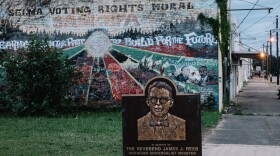Cat Schuknecht
-
Some challenges feel insurmountable. But psychologist Emily Balcetis says the solutions are often right in front of our eyes. This week, as part of our annual series on personal growth and reinvention, Emily explains how we can harness our sight to affect our behavior.
-
Not long after his sixteenth birthday, Fred Clay was arrested for the murder of a cab driver in Boston. Eventually, Fred was found guilty — but only after police and prosecutors used questionable psychological techniques to single him out as the killer. This week on Hidden Brain, we go back four decades to uncover the harm that arises when flawed ideas from psychology are used to determine that a teenager should spend the rest of his life behind bars.
-
If we do a favor for someone we know, we think we've done a good deed. What we don't tend to ask is: Who have we harmed by treating this person with more kindness than we show toward others? This week, in the second of our two-part series on moral decision-making, we consider how actions that come from a place of love can lead to a more unjust world.
-
We don't always behave the way economic models say we will. We don't save enough for retirement. We give money to charity. This week, why we act in ways that go against our "rational" self-interest.
-
One day after the United States signed an agreement with the Taliban, Ashraf Ghani said a proposed prisoner swap between the Taliban and his government could not be a precondition for talks.
-
Ken Starr was stripped of his presidency at Baylor University in 2016, accused of overseeing an administration that ignored a campus sexual assault scandal.
-
Jeffrey Epstein died by apparent suicide on Saturday while awaiting trial on charges of sex trafficking. With no defendant to stand in court, the criminal case against Epstein is effectively over.
-
Former students at the Dalton School in Manhattan remember Epstein as a young, charismatic teacher. More than four decades later, Epstein stands accused of sexually abusing dozens of underaged girls.
-
Alabama officials tell NPR that if the FBI had shared its case file, they would have investigated the James Reeb murder case while one of the assailants was still alive.
-
A fourth man was involved in the 1965 attack on civil rights worker and minister James Reeb, but that man was never identified or charged in Reeb's murder, an NPR investigation revealed.










